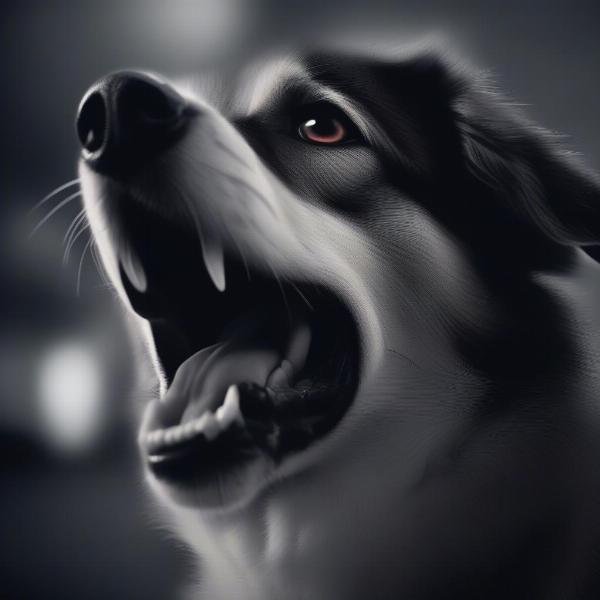If your dog is howling at night, it can be disruptive and concerning. Understanding why your dog is engaging in this behavior is the first step to finding a solution. From medical reasons to environmental triggers and even just plain boredom, this article will explore the common causes of nighttime howling and provide practical advice to help you and your furry friend get a peaceful night’s sleep.
Why is My Dog Howling at Night?
There are several reasons why a dog might howl at night. It’s important to remember that howling is a natural form of canine communication, and doesn’t always indicate a problem. However, frequent or excessive howling can be a sign of an underlying issue.
Loneliness and Boredom
Dogs are social animals and can become lonely or bored if left alone for extended periods, especially at night. This can lead to howling as a way to express their frustration or try to attract attention. Providing your dog with plenty of mental and physical stimulation during the day can help reduce nighttime howling.
Medical Concerns
Sometimes, howling can be a sign of pain or discomfort. If your dog has suddenly started howling at night, it’s essential to rule out any underlying medical conditions. Conditions like cognitive dysfunction, deafness, or pain can cause a dog to vocalize more.
Environmental Triggers
Dogs have sensitive hearing and can be triggered by noises that we might not even notice. Sounds like sirens, other dogs barking, or even wildlife can prompt a dog to howl in response.
Anxiety and Separation Anxiety
Dogs experiencing anxiety, especially separation anxiety, might howl as a way to cope with their distress. Creating a calming and secure environment for your dog, along with behavior modification techniques, can help alleviate anxiety-related howling.
How to Stop a Dog from Howling at Night
Once you’ve identified the potential cause of your dog’s nighttime howling, you can start implementing solutions. Here are some strategies to help curb the howling:
- Increase Daytime Exercise and Enrichment: A tired dog is less likely to howl at night. Ensure your dog gets sufficient physical activity and mental stimulation during the day through walks, playtime, and interactive toys.
- Create a Comfortable Sleeping Environment: A comfortable and secure sleeping area can help reduce anxiety and promote relaxation. Provide a cozy bed, familiar toys, and perhaps a piece of your clothing to comfort your dog.
- Address Underlying Medical Issues: If you suspect a medical reason for the howling, consult your veterinarian for a thorough check-up.
- Block Out Environmental Triggers: Try to identify and minimize any external noises that might be triggering your dog’s howling. White noise machines, closing windows, or earplugs for your dog can be helpful.
 Dog Howling at Night Due to Anxiety
Dog Howling at Night Due to Anxiety
Training and Behavior Modification
- Ignore the Howling: Sometimes, giving attention to the howling, even negative attention, can reinforce the behavior. Try ignoring the howling and only rewarding quiet behavior.
- Desensitization and Counterconditioning: If your dog is howling in response to specific triggers, you can gradually desensitize them to those triggers and countercondition them to associate the triggers with positive experiences.
- Consult a Professional Dog Trainer or Behaviorist: For persistent howling issues, seeking professional guidance from a certified dog trainer or veterinary behaviorist can be invaluable. They can help you develop a tailored behavior modification plan.
Conclusion
Dealing with a dog howling at night can be challenging, but with patience and the right approach, you can help your dog (and yourself) get a good night’s sleep. Remember to address the underlying cause of the howling, whether it’s loneliness, anxiety, or a medical issue. By providing a stimulating environment, addressing potential triggers, and employing appropriate training techniques, you can create a more peaceful nighttime routine for both you and your furry companion. If you are still struggling with your dog’s nighttime howling, consult a veterinarian or a professional dog trainer for further assistance.
FAQ
- Why does my dog only howl at night? Nighttime can amplify anxieties and sensitivities, leading to howling. Also, there are often fewer distractions to keep your dog occupied.
- Is it bad to ignore my dog when they howl? If the howling is attention-seeking, ignoring it can be an effective way to discourage the behavior.
- Can howling be a sign of a serious medical problem? Yes, howling can sometimes indicate pain or discomfort. Consult your vet if you are concerned.
- How long does it take to stop a dog from howling at night? The time it takes varies depending on the underlying cause and the chosen methods. Consistency is key.
- What if nothing I do stops the howling? If you’ve tried various methods and the howling persists, consult a professional dog trainer or veterinary behaviorist.
- Could my dog’s howling be a sign of old age? Senior dogs can experience cognitive decline which may lead to increased vocalization.
- Is my dog howling because they are hearing something I can’t? Dogs have much more sensitive hearing than humans, so it’s possible they are reacting to sounds you can’t perceive.